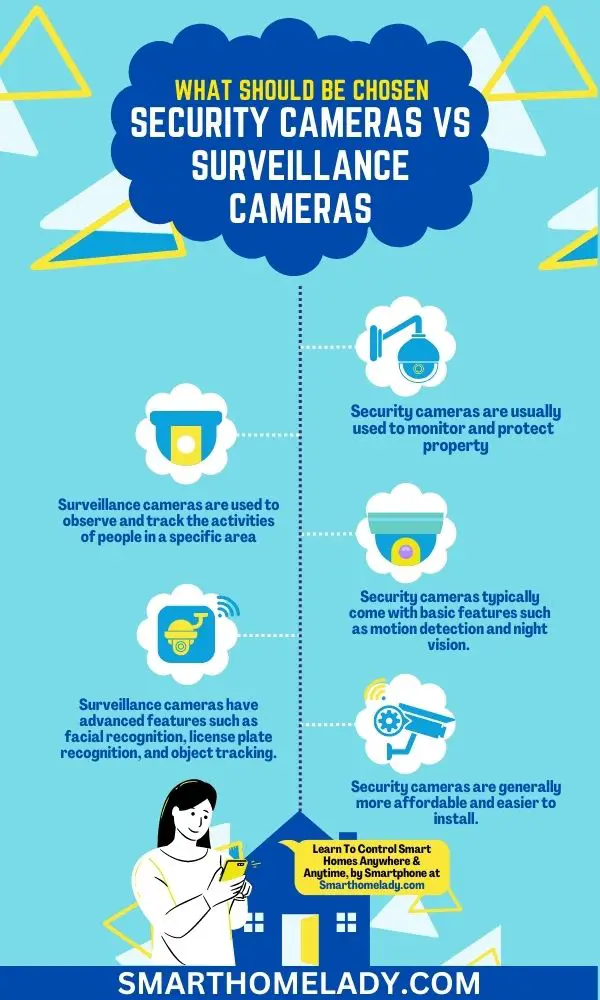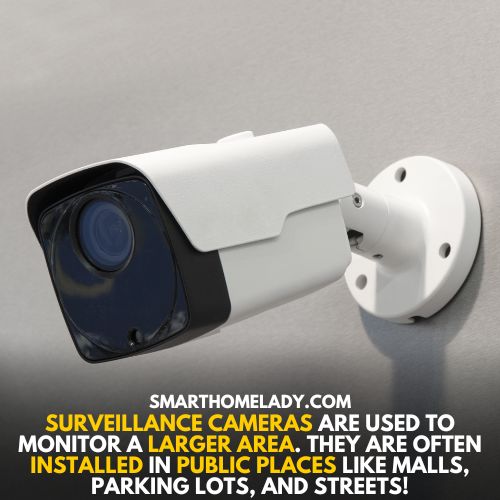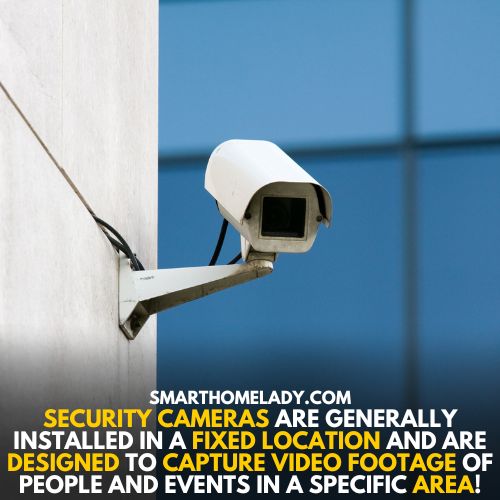As a security camera user, I often get asked about security cameras vs surveillance cameras. And what should be chosen? While both types of cameras are used for monitoring purposes, some key differences set them apart.
Security cameras are typically used for monitoring specific areas of a property, such as entrances and exits, while surveillance cameras are designed for more comprehensive monitoring of larger areas.
Understanding the differences between these two types of cameras is crucial in choosing the best option for your specific security needs.
In this article, we will explore security cameras vs surveillance cameras, their features, benefits, and drawbacks. So, let’s dive in.

Contents
- 1 Understanding The Differences Between Security And Surveillance Cameras
- 2 4 Key Differences Between Security Cameras Vs Surveillance Cameras
- 3 Pros And Cons Of Security Cameras Vs Surveillance Cameras
- 4 Choosing The Right Camera For Your Needs
- 5 What is security cameras in surveillance?
- 6 What is security and surveillance?
- 7 What are surveillance cameras called?
- 8 Is CCTV a security camera?
- 9 What are the three types of surveillance?
- 10 Conclusion
Understanding The Differences Between Security And Surveillance Cameras
Security cameras and surveillance cameras are two distinct types of cameras that are used for different purposes. Although they share some similarities, they are different in many ways.
Security cameras are usually used to monitor and protect property, while surveillance cameras are used to observe and track the activities of people in a specific area.
Suggested Readings
- Can Security Cameras See Smoke?
- How Far Can Security Cameras See At Night?
- Can Security Cameras See Inside Cars?
- Why Do Security Cameras Have Green Lights?
- How Far Can Security Cameras See?
Security cameras are usually installed in homes, businesses, and government buildings, while law enforcement agencies and other organizations typically use surveillance cameras to monitor public spaces.
One of the main differences between security cameras and surveillance cameras is their purpose.
Security cameras are primarily designed to provide security for a particular property or area. They are used to monitor and record activities, detect intruders, and prevent crime.
On the other hand, surveillance cameras are usually used to observe and track people in public spaces. They are often used by law enforcement agencies to monitor criminal activity, track suspects, and gather evidence.
Another key difference is the level of control that the user has over the camera. The property owner or manager usually controls security cameras, while a centralized agency or organization typically controls surveillance cameras.
| Feature | Security Camera | Surveillance Camera |
|---|---|---|
| Purpose | Monitor and protect a property | Observe and track people in public spaces |
| Control | Controlled by property owner/manager | Controlled by a centralized agency/organization |
| Location | Installed in homes, businesses, and government buildings | Installed in public spaces |
| Recording | Record activities to detect intruders and prevent crime | Observe and record criminal activity to gather evidence |
| Resolution | Higher resolution for facial recognition | Lower resolution for wider area coverage |
| Cost | Lower cost for individual use | Higher cost for centralized use |
| Privacy Concerns | May raise privacy concerns for individuals | May raise privacy concerns for public spaces |
4 Key Differences Between Security Cameras Vs Surveillance Cameras
When it comes to choosing between security cameras and surveillance cameras, it’s important to understand the differences between the two.
Many people believe that the terms are interchangeable, but they actually refer to different types of cameras with distinct features and capabilities. Here are 4 key differences between the two.
1. Functionality And Purpose
Security cameras are generally used to monitor a specific area, such as a home or office. They are designed to provide a clear view of the area and help deter potential intruders. They can also be used to monitor employees or visitors to a location.
On the other hand, surveillance cameras are used to monitor a larger area. They are often installed in public places like malls, parking lots, and streets. Surveillance cameras are designed to help law enforcement monitor criminal activity and provide evidence in court.

Suggested Readings
- What Causes Video Loss In Security Cameras?
- Where Do Security Cameras Store Data?
- Why Do My Security Cameras Go Black?
- CCTV Camera Showing Black Screen
2. Features Of Security Cameras vs Surveillance Cameras
Security cameras typically come with basic features such as motion detection and night vision. Surveillance cameras have advanced features such as facial recognition, license plate recognition, and object tracking.
Motion detection is a basic feature commonly found in security and surveillance cameras. However, surveillance cameras generally have more advanced motion detection capabilities, such as ignoring minor movements and focusing on more significant ones.
Both types of cameras typically have night vision features, although surveillance cameras may have more powerful infrared lights for better visibility in complete darkness.
Surveillance cameras have more advanced features than security cameras. However, this does not necessarily mean they are better for all purposes.
Security cameras are generally more affordable and easier to install, making them a good option for basic home security.
Surveillance cameras, on the other hand, are more expensive and require more technical expertise to set up and operate. They are better suited for large-scale installations in commercial or industrial settings, where advanced features such as facial recognition and license plate recognition are necessary.
| Feature | Security cameras | Surveillance cameras |
|---|---|---|
| Features | Basic features such as motion detection and night vision | Advanced features such as facial and license plate recognition |
| Pros | Affordable and easy to use | Provide detailed information for investigations |
| Cons | Limited features | Can be expensive and require advanced technical expertise |
3. Technology In Security Cameras vs Surveillance Cameras
Security cameras are electronic devices that are used to monitor and record the activities of people and objects in a specific area.
They use CCTV technology to capture and transmit video footage through wired or wireless connections to a central monitoring system. This system can be accessed by authorized personnel who can view the footage in real-time or review it later for investigative purposes.
Modern surveillance cameras are equipped with advanced technology such as facial recognition software. This software allows them to identify individuals based on unique facial features and motion detection sensors.
It activates the cameras when they detect movement in their field of view. Some cameras can also record audio and capture images in low-light conditions.
| Feature | Security cameras | Surveillance cameras |
|---|---|---|
| Technology | CCTV | Advanced technology including facial recognition |
| Pros | Reliable and stable connection | Can be accessed remotely |
| Cons | Limited features | Can be vulnerable to hacking |
Surveillance cameras can be connected through the internet, enabling remote access to the footage anywhere in the world. This feature is particularly useful for businesses and homeowners who want to monitor their property when they are away.
The footage can also be stored in the cloud, which provides a secure backup and makes it easily accessible from any device with an internet connection.
4. Applications Of Security Cameras vs Surveillance Cameras
Security cameras are typically used to monitor and protect property, people, and assets against theft, vandalism, and other criminal activities. They are commonly used in retail stores, banks, and other high-security areas where a high level of security is required.
Security cameras are generally installed in a fixed location and are designed to capture video footage of people and events in a specific area.

Suggested Readings
- Do Home Security Cameras Use A lot Of Electricity?
- Security Cameras That Work When Power Goes Out
- Can Security Cameras See In The Dark?
- Can Security Cameras Be Jammed?
- Can You Use Any DVR With Security Cameras?
Surveillance cameras, on the other hand, are used to monitor a wide range of activities, including traffic, public behavior, and the environment. They are typically used in public spaces such as malls, parking lots, and streets.
Surveillance cameras are designed to capture video footage of a large area and are often equipped with advanced features such as facial recognition software and license plate recognition.
In short, while security cameras are primarily used for protecting property and people against criminal activities, surveillance cameras are used for monitoring public areas and activities.
5. Legal Considerations For Security And Surveillance Cameras
Security and surveillance cameras are used to monitor and record activities in a particular area. However, some legal considerations differentiate the two.
Legal Considerations for Security Cameras
- Security cameras are generally used for protecting property and people. They can be installed in public areas, private businesses, and homes for security purposes.
- The installation of security cameras must comply with privacy laws. The cameras must not invade an individual’s privacy, and their use must be proportionate to the risks they aim to address.
- The footage obtained from security cameras can only be used for specific purposes, such as investigating a crime or identifying a suspect.
- The individuals installing and operating security cameras must comply with data protection laws, including the USA’s California Consumer Privacy Act (CCPA).
Legal Considerations for Surveillance Cameras
- Privacy Laws – Surveillance cameras can potentially invade an individual’s privacy, so it is essential to comply with privacy laws.
- Consent – It is important to obtain consent from the individuals who are being recorded. This can be done by posting signs where the cameras are installed, informing individuals of the cameras’ presence and purpose.
- Location – The placement of surveillance cameras should be carefully considered. Cameras should not be placed in areas where individuals have a reasonable expectation of privacy, such as restrooms, changing rooms, or private offices.
- Data Storage – Data collected through surveillance cameras should be stored securely and only accessed by authorized individuals. It is important to have policies in place for the retention and disposal of recorded footage to ensure compliance with privacy laws.
- Use of Footage – The use of surveillance footage should be limited to the purpose for which it was collected. It should not be used for any other purpose without the consent of the individuals recorded.
- Access to Footage – Access to surveillance footage should be restricted to authorized individuals only, and there should be policies in place to ensure that access is granted only when necessary.
- Employee Monitoring – Employers should inform employees of the use of surveillance cameras in the workplace and the purpose for which they are being used. Employers should also ensure that they comply with labor laws regarding employee monitoring.
- Cybersecurity – Surveillance cameras should be secured against cyber-attacks and should be regularly updated to ensure the security of the data collected.
As an expert in this field, I cannot stress enough how important it is to take into account both privacy concerns and ethical considerations when using security or surveillance cameras on your property.
By doing so, you can protect yourself from any legal repercussions while maintaining a safe environment for everyone involved.
Pros And Cons Of Security Cameras Vs Surveillance Cameras
The pros and cons of both types of cameras have already been discussed above in detail. However, here are some pros and cons that are described comprehensively.
Pros of Security Cameras
Security cameras are designed to protect a specific area from unauthorized access and monitor any suspicious activities. Some advantages of security cameras are that;
- They can deter theft, provide evidence in criminal investigations
- Allow remote monitoring.
- Security cameras can also be used to improve employee productivity and monitor workplace safety.
Cons of Security Cameras
- Security cameras can also raise privacy concerns and create a sense of distrust among employees.
- Some people may also feel uncomfortable with being constantly monitored, leading to a negative impact on employee morale.
Pros of Surveillance Cameras
Surveillance cameras are designed to monitor a larger area and provide a more comprehensive view of activities. Some advantages of surveillance cameras are that:
- They can help prevent and investigate crime, monitor traffic, and improve public safety.
- Surveillance cameras can also be used to monitor large events and provide real-time updates to law enforcement.
Cons of Surveillance Cameras
- Surveillance cameras can also raise privacy concerns and be used for unethical purposes.
- They can also be expensive to install and maintain and may require significant storage space for recorded footage.
So, after reading a detailed comparison between security cameras vs surveillance cameras, you can easily choose the right one for your needs.

Suggested Readings
- Do You Need A License To Install Security Camera?
- Is It Illegal To Tamper With Security Cameras?
- Can We Use CCTV Camera Without DVR?
- Can I Use Xfinity Security Camera Without Service?
- Do Security Cameras Have To Be Visible?
Choosing The Right Camera For Your Needs
When choosing the right camera for your needs, you’ll want to consider both cost-effective options and DIY installation tips.
For those on a tight budget, several affordable security camera models are available that don’t compromise on quality. Additionally, many companies offer easy-to-follow instructions for installing these devices yourself without professional help.
Ultimately, whether you decide to go with a security or surveillance camera will depend on your individual needs and preferences.
It’s essential to weigh the pros and cons of each option before making your final decision.
By doing so, you can ensure that you’re getting the best possible device for your particular situation without overspending or sacrificing quality in the process.
Frequently Asked Questions FAQs
What is security cameras in surveillance?
Security cameras in surveillance are devices that are designed to capture and record activities in a particular area. These cameras are usually placed strategically to monitor activities and detect unusual behavior.
They are used to enhance security in various settings, including homes, businesses, and public places.
What is security and surveillance?
Security and surveillance refer to the use of technology and other methods to monitor and protect people, property, and assets.
Security involves the measures taken to prevent unauthorized access, theft, and damage, while surveillance refers to monitoring activities to detect any suspicious or criminal behavior.
Security and surveillance are used to create a safe and secure environment.
What are surveillance cameras called?
Surveillance cameras are also known as security, CCTV, or closed-circuit television cameras.
These cameras are designed to capture and record activities in a specific area and are commonly used to enhance security in various settings.
Is CCTV a security camera?
Yes, CCTV is a type of security camera. CCTV stands for closed-circuit television, which means that the camera is connected to a closed system that is monitored by authorized personnel.
CCTV cameras are commonly used in public places like banks, airports, and government buildings to monitor activities and enhance security.
What are the three types of surveillance?
The three types of surveillance are physical, electronic, and human.
1. Physical surveillance involves the use of cameras, drones, and other devices to monitor activities in a specific area.
2. Electronic surveillance involves the use of technology, such as GPS tracking, to monitor the movement and activities of individuals.
3. Human surveillance involves the use of undercover agents and informants to gather information about criminal activities.
Conclusion
In conclusion, security cameras and surveillance cameras serve different purposes, but both are essential in providing safety and security.
Security cameras are ideal for monitoring and detecting potential threats, while surveillance cameras are perfect for tracking and recording events. Ultimately, the choice between the two depends on your specific needs and goals.
If you want to increase security in your home or business, investing in security and surveillance cameras is a wise decision. With the latest technology, you can easily monitor multiple cameras from a single device and receive real-time alerts in case of any suspicious activity.
Don’t compromise your safety and security. Take action today and invest in the right security and surveillance cameras that suit your requirements. Your peace of mind is worth it!


